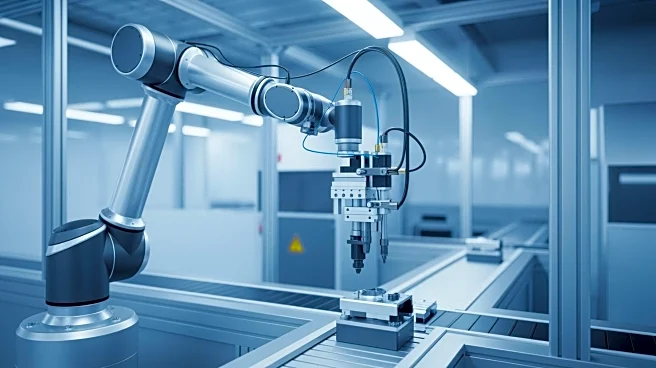What's Happening?
Manufacturers are increasingly adopting Agentic AI to address challenges such as rising costs, fragile supply chains, and sustainability demands. Unlike generative AI, which focuses on content creation, Agentic AI systems can autonomously analyze, decide,
and act, functioning as digital colleagues within manufacturing processes. These AI agents take on roles such as procurement, production scheduling, and quality control, leading to increased uptime, improved quality, and reduced costs. The integration of Agentic AI is seen as a way to create a human-led, agent-augmented workforce, where repetitive tasks are automated, allowing human workers to focus on creativity and innovation.
Why It's Important?
The adoption of Agentic AI in manufacturing is significant as it promises to enhance productivity and resilience in the industry. By automating routine tasks, manufacturers can achieve substantial reductions in maintenance costs and energy use, while also improving product quality and compliance. This shift not only addresses current industry pressures but also positions manufacturers to meet future demands for faster innovation and lower emissions. The transformation towards an agentic enterprise could lead to significant economic benefits, potentially translating into hundreds of millions in annual value for large manufacturers.
What's Next?
As manufacturers continue to integrate Agentic AI, the focus will be on scaling these systems across entire enterprises. Starting with low-risk functions, companies are expected to gradually expand the use of AI agents to more complex processes, building trust and demonstrating value. By 2035, the industry could see the realization of fully closed-loop manufacturing, with self-healing supply chains and predictive quality management eliminating large-scale recalls. This evolution is anticipated to create a more competitive and sustainable manufacturing sector.
Beyond the Headlines
The shift towards Agentic AI in manufacturing raises important considerations about the future of work. While the technology augments human capabilities, it also necessitates new roles and skills, such as agent supervisors and AI-enabled engineers. This evolution underscores the need for workforce training and adaptation to ensure that employees can effectively collaborate with AI systems. Additionally, the ethical implications of increased automation and data-driven decision-making will require careful management to balance technological advancement with human oversight.
















